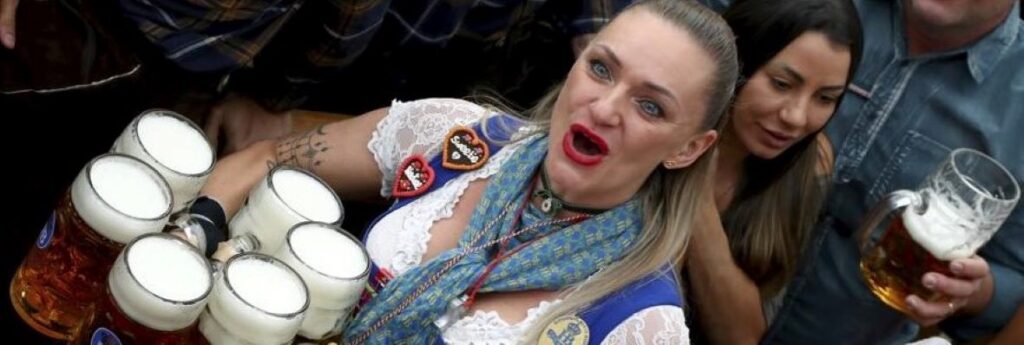Oktoberfest is back in Germany after two years of pandemic cancellations – the same bicep-challenging beer mugs, fat-dripping pork knuckles, pretzels the size of dinner plates, men in leather shorts and women in cleavage-baring traditional dresses.
But while brewers are more than glad to see the return of the Bavarian capital’s sudsy tourist centrepiece, both they and visitors are under pressure from inflation in a way that could scarcely be imagined the last time it was held in 2019.
For one thing, the 1-litre mug of beer will cost between €12.60 and €13.80 ($16.75 and $18.35) this year, which is an increase of about 15% compared with 2019, according to the official Oktoberfest homepage.
The event opened at noon Saturday when Munich’s mayor tapped the first keg and announced “O’zapft is,” or “It’s tapped” in Bavarian dialect.
For Germany’s brewers, rising costs mirror of the inflation running across the economy: Sky-high natural gas prices caused by Russia’s war in Ukraine are boosting what businesses and consumers have to pay for energy, while recovering demand from the pandemic is making parts and raw materials hard to come by.
Brewing equipment is often fuelled by natural gas, and prices for barley malt – or grain that has been allowed to germinate by moistening it – have more than doubled, to over €600 a ton. Glass bottles have risen by 80%, as glassmakers pay more for energy. Bottle caps are up 60%, and even glue for labels is in short supply.
“Prices for everything have changed significantly this year,” said Sebastian Utz, head technician at Munich’s historic Hofbraeu Brewery, which traces its roots in the city to 1589. “To brew beer you need a lot of energy… and for refrigeration. And at the same time, we need raw materials – barley malt, hops – where procurement has increased in price.”
The costs of everything – cardboard, stainless steel for barrels, wood pallets, cleaning supplies to keep the brewing tanks spotless – have gone up.
“These are prices that the German brewing industry has never seen before,” said Ulrich Biene, spokesman for the historic family owned Veltins Brewery in Grevenstein, which is not one of the brands sold at Oktoberfest.
Inflation hit an annual 7.9% in Germany in August, and a record 9.1% in the 19 countries that use the euro currency. Rising consumer prices in Europe have been fuelled above all by Russia restricting supplies of natural gas, driving prices through the roof.
All that gets built into the prices of things people buy, and those higher prices cut into their purchasing power.
In any case, Oktoberfest is a much-needed boost for Munich’s tourism, hotels, and food service industries.
“It’s beautiful,” Mayor Dieter Reiter said. “You can see the enthusiasm has returned.” He downplayed concerns about such a big event during the pandemic, saying the spread of COVID-19 is “no longer the decisive factor” and adding, “Let’s see how it goes.”
Some 487 beer breweries, restaurants, fish and meat grills, wine vendors and others will serve revelers at Oktoberfest, and opening hours will be even longer than in the past, with the first beer tents opening at 9 a.m. and closing at 10:30 p.m. The last orders will be taken at 9:30 p.m.
In the years before COVID-19, about 6 million people visited the celebrations annually, many of them dressed in traditional Bavarian garb – the women in Dirndl dresses, the men in Lederhosen.
Oktoberfest, first held in 1810 in honour of the marriage of Crown Prince Ludwig of Bavaria to Princess Therese, has been cancelled dozens of times during its more than 200-year history due to wars and pandemics.
Festivities this year continue until Oct. 3.

